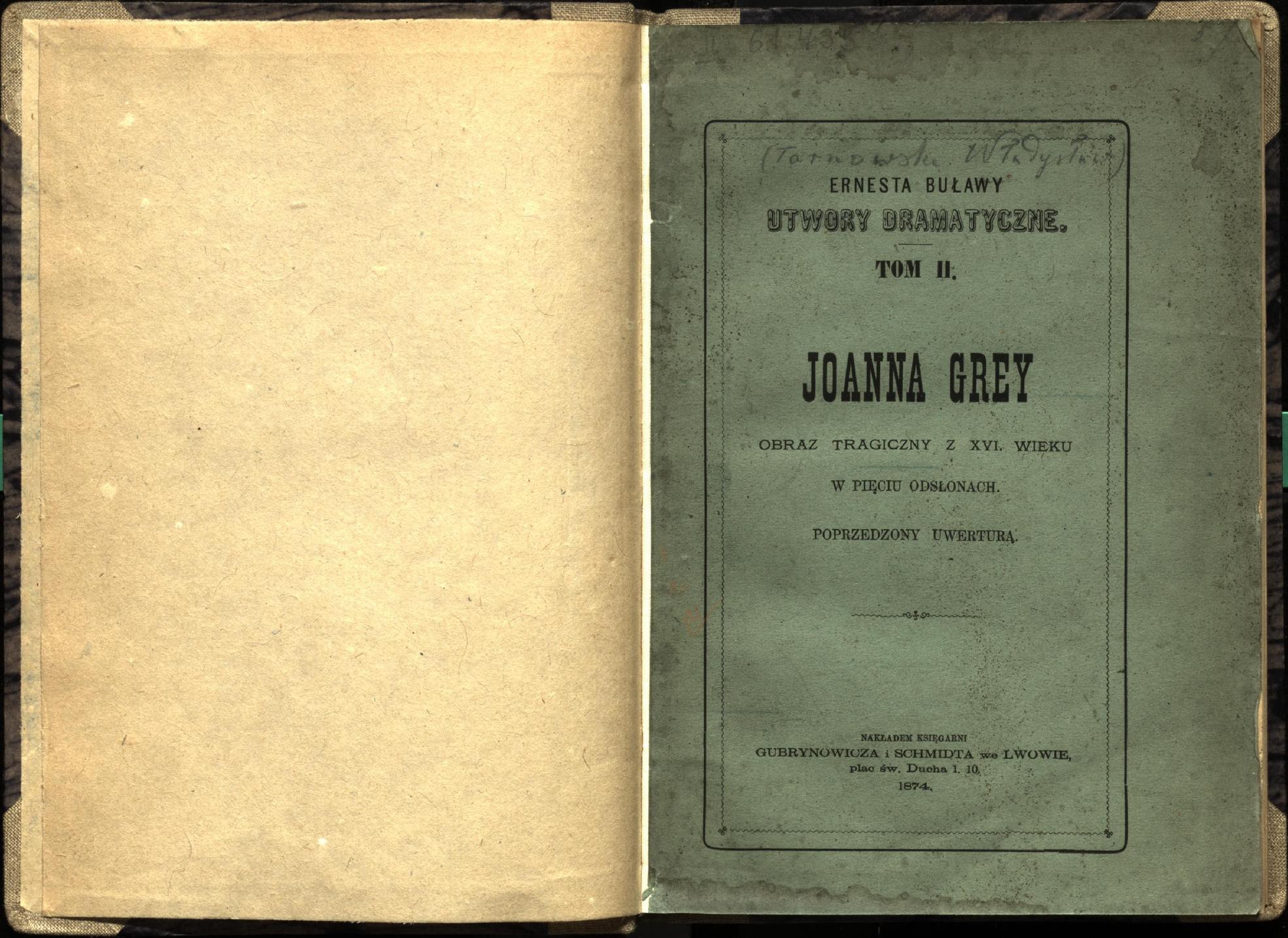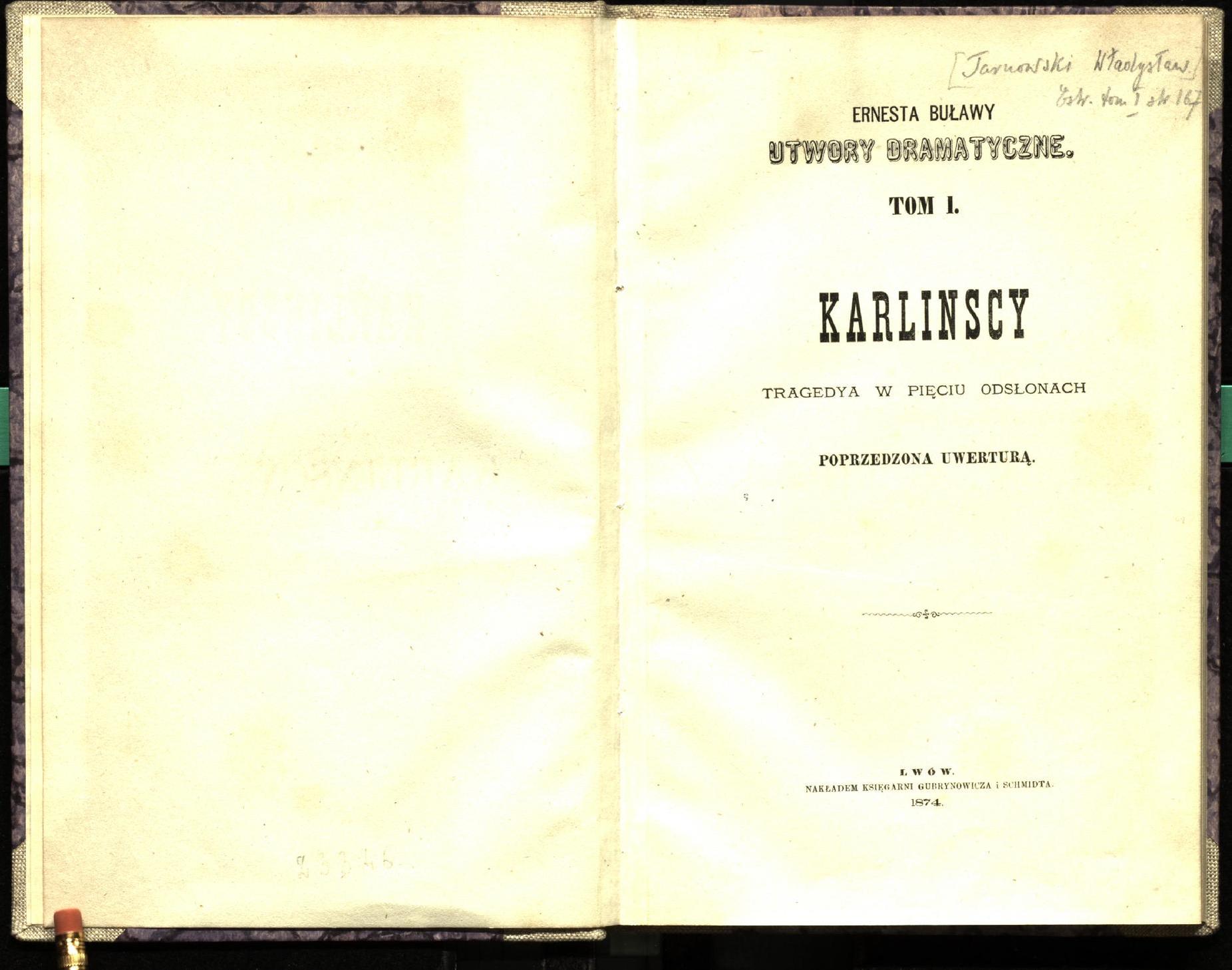Władysław Tarnowski

Count Władysław Tarnowski (June 4, 1836, Wróblewice, administrative district of Drohobycz, in the modern day Ukraine – April 19, 1878, near San Francisco while on a steamer from Japan; also known by the literary pseudonym Ernest Buława (Ernest Mace)) was a pianist, composer, poet, dramatist, and translator.

Biography
He was the son of Count Walerian Spycimir Tarnowski and Ernestyna Tarnowska. Recognized as talented at an early age, he was introduced to famed composer Frédéric Chopin. He studied in Lvov and Cracow, with Daniel-François-Esprit Auber at the Conservatoire de Paris, with a break during the time of the January Uprising of 1863-1864, during which he wrote the song "Jak to na wojence ładnie" ["Isn't the war fun"] which remains popular to the modern day, in various alterations. He traveled widely, giving concerts in Wroclaw in 1860 and 1875, Lvov in 1875, Vienna, Venice and Firence in 1872, and Paris in 1873.
Compositions
Intimate
- String quartet in D major, scans in IMSLP / Petrucci Music Library
- Fantasia quasi una sonata (on violins and piano)
- Souvenir d'un ange (Vienna about 1876, publ. V. Kratochwill)
Piano
- 3 Mazurkas (3 Mazurkas, Vienna about 1870, publ. Bösendorfer)
- 2 pieces : Chart sans paroles, Valse - poeme (both Leipzig c. 1870, publ. Ch. F Kahut)
- Impromptu "L'adieu de l'artiste" (Vienna c. 1870, publ. J. Gutmann)
- Sonate pour piano composée et dediée a son ami Br. Zawadzki (Vienna c. 1875, publ. V. Kratochwill)
- Grande polonaise quasi rhapsodies symphonique (Vienna c. 1875, publ. J. Gutmann)
- Extases au Bosphor, fantasie rhapsodies sur les melodies orientales op. 10 (Leipzig c. 1875, publ. Forberg)
- Nocturne dédié à sa soeur Marie (Viena, n.d.)
- Ave Maria, dedicated to J. I. Kraszewski (in: Album Muzeum Narodowego w Rapperswyllu, 1876, pp. 577-578)
Ave Maria - Andantino pensieroso ("Echo Muzyczne", Warszaw, issue 6, 17 XII 1878.)[1]
Songs
Solo:
- Uhlans march, called also Soldiers song, March soldier's Langiewicza with initial words: "A kto chce rozkoszy użyć”<And who wants pleasure to use>, and today more well-known with words "Jak to na wojence ładnie” <How this on war nicely> (first publications: „Kieszonkowy słowniczek polski z melodiami” Poznan 1889, publ. J. Leitgebera and " War song” Lwow 1908, publ. B. Połoniecki, suitably).
With piano accompaniment:
- Cypryssen 5 characterische Gesänge (Vienna 1870, publ. Bösendorfera), songs to poem Ludwig Foglar; fifth of the songs Ich sank verweint in sanften Schlummer
- Neig, o Schöne Knospe, song to poem Mirza Shafi Vazeh
- Zwei Gesänge mit Begleitung des Pianoforte – Du buch mit Siegen Siegeln, Ob Du Nun ruhst, songs to poem Ludwig Foglar (Vienna c. 1870, publ. V. Kratochwill)
- Zwei Gesänge: Klänge Und Schmerzen, Nächtliche Regung (Leipzig, c. 1870, publ. Ch. E. Kahnt)
- Still klingt das Glöcklein durch Felder (Vienna c. ~1875, publ. J. Gutmann)
- Kennst du die Rosen., to own poem, (published J. Gutmann in Vienna.)
- Mein Kahn - song to poem by Johann von Paümann ps. Hans Max (Wiedeń, wyd. Buchholz & Diedel)
Stage
- Achmed the oder the Pilger the Liebe (Achmed, pielgrzym milości>, to own libretto, based on the tale Washington Irving Legend of Prince Ahmed al Kamel, or, The Pilgrim of Love. from Tales of the Alhambra. The piano extract, Leipzig, c. 1875, publ. R. Forberg, which scans in the digital collections Österreichische Nationalbibliothek.)
- Karlinscy (music to own theatrical art, Vienna 1874, publ. V. Kratochwill)
- Joanna Grey (music to own theatrical art, Vienna 1875, publ. V. Kratochwill)
The patron of the art, poems, the articles, reviews of literary works(ex. in „Ruch literacki” and „Tygodnik ilustrowany”).
Literary works
Poetry
- Krople czary <The Drops of goblet> 1865
- Szkice helweckie i Talia <Helvetian drafts and Waist>1868 (Leipzig, publ. P. Rhode)
- Piołuny <Absinthes> 1869
- Kochankowie ojczyzny <The Lovers of motherland> 1872
Dramas
- Karlińscy 1874 [2]
- Joanna Grey <Jane Grey> 1875 [3]
- The Achmed the oder the Pilger the Liebe - libretto in German.
Publicist
- Articles and reviews in „Ruch literacki” and „Tygodnik ilustrowany”.
Documentary
- Archiwum Wróblewieckie (Lvov 1883, publ. Gubrynowicz and Schmidt; Poznan - Dresden 1869, publ. J. I. Kraszewski)
Translations
- The Osjan Song,
- Hamlet W. Shakespeare'a
- Works P.B. Shelley
- Works H. Haine
- P. Cornelius: Grundzüge der Geschichte der Musik, well-known with translated title: Zarys historii muzyki <The "Outline of history of music>(Leipzig 1869).
External links
Free scores by Władysław Tarnowski at the International Music Score Library Project (IMSLP)
References
- Encyklopedia muzyczna, publ. PWM 2009
- Encyklopedia muzyki, publ. PWN 2001
- Encyklopedia literatury, publ. PWN 2007
- Sir George Grove, (edited by Stanley Sadie) The New Grove Dictionary of Music and Musicians, II edition, Vol. 25 (Taiwan to Twelwe Apostles), 2001, str. 103-104.
- Franz Stieger peralexikon, Part II – Komponisten, Vol. 3 (N-Z), Verlegt Bei Hans Schneider, Tutzing, 1978, p. 1097.
- Franz Stieger Operalexikon, Part III – Libréttisten, Vol. 3 (Q-Z), Verlegt Bei Hans Schneider, Tutzing, 1981, p. 936.


